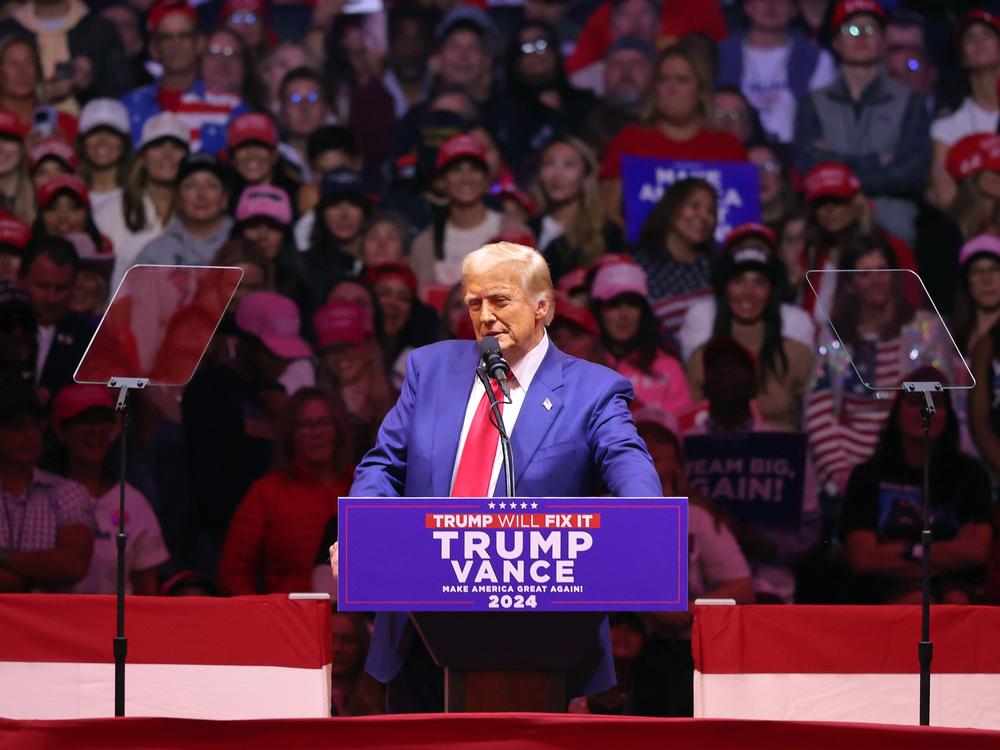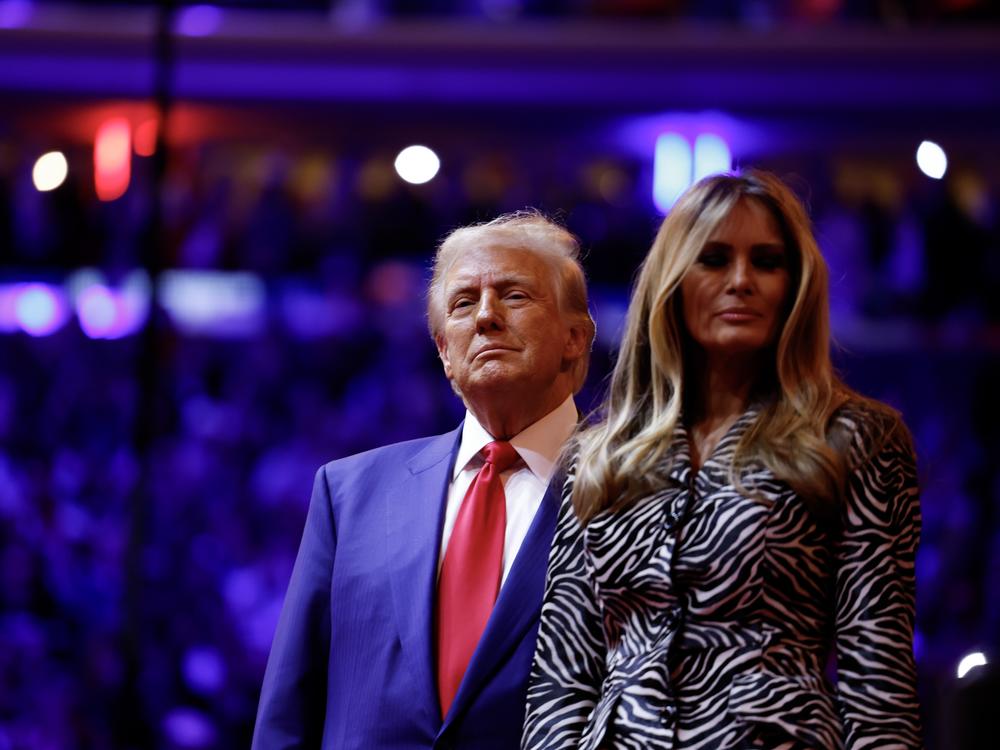Section Branding
Header Content
Off-color jokes, vitriol take over Trump Madison Square Garden rally
Primary Content
Donald Trump put on a rally in New York City’s Madison Square Garden on Sunday to kick off the final full week of campaigning for president, complete with celebrity guests and a new economic proposal. But repeated insults and at times racist and misogynistic remarks from guest speakers threatened to grab the most attention.
The final weeks of a campaign are often when candidates put forth a unifying message to gather as many voters as possible. Trump’s Madison Square Garden rally was instead marked by swear words, racist jokes about Latinos, and misogynistic remarks.
The focus could help Trump grab headlines and mobilize some existing supporters, though it's unlikely to bring in new voters who are already turned off by some of the Republican presidential candidate’s rhetoric.
The first speaker at the former president’s Madison Square Garden rally, roast comedian and podcast host Tony Hinchcliffe, set the tone with a disparaging joke about welcoming Latinos into the U.S. “with open arms” while making a shooing motion.
He also disparaged Latinos with a crass joke about making babies and illegal immigration, quipped that Puerto Rico is “a floating island of garbage,” and joked that Kansas City Chiefs tight end Travis Kelce “might be the next O.J. Simpson,” referring to the football star who was accused and later acquitted of murdering his ex-wife.
Kelce is in a relationship with pop singer Taylor Swift, who earlier this year said she would vote for Vice President Kamala Harris.
Trump has made anti-immigrant rhetoric a centerpiece of his campaign. As president, he also talked about ending the automatic right to citizenship for babies born in the U.S. to noncitizens —though many scholars agree changing the law could require a constitutional amendment.
The Trump campaign is currently fighting to get votes from women and Latinos. Polls suggest the gender gap in this year’s election could be the largest on record. The Harris campaign, in contrast, has been highlighting stories of women whose lives have been threatened by strict abortion bans.
The Harris campaign immediately seized on Hinchcliffe’s remarks about Puerto Rico. In a tweet posted after his introduction, Hinchcliffe wrote in response, “These people have no sense of humor.” He also added, “I love Puerto Rico and vacation there. I made fun of everyone… watch the whole set.”
Defining who is an American
The rally marshaled high-profile Trump supporters including Terry Bollea — better known as the professional wrestler Hulk Hogan — television personality Dr. Phil McGraw, and singer-songwriter Lee Greenwood.
But other Trump allies appealed to an “us versus them” mentality. Radio host Sid Rosenberg insulted former Democratic presidential candidate Hillary Clinton, as well as the Democratic Party as a whole.
“The whole party — a bunch of degenerates,” he added. “Jew-haters and lowlifes, every one of them.”
Multiple speakers also insulted Harris, with private equity fund manager Grant Cardone calling her a "fake." "Her and her pimp handlers will destroy our country," he said.
Conservative commentator Tucker Carlson later made fun of Harris’ mixed-race heritage.
“It’s gonna be pretty hard [for Democrats] to look at us and say, ‘You know what? Kamala Harris, she got 85 million votes because she’s just so impressive. As the first Samoan-Malaysian low-IQ former California prosecutor ever to be elected president. It was just a groundswell of popular support.’”
Carlson went beyond insults, nodding to the racist “great replacement theory” he has espoused in the past.
“People know in a country that has been taken over by a leadership class that actually despises them and their values and their history and their culture and their customs, really hates them to the point that it's trying to replace them,” he said. “They know someone who actually has affection for them and that's Donald Trump. And it’s requited.”
That sentiment was echoed later, when former Trump White House aide Stephen Miller told the crowd: “America is for Americans and Americans only.”
Tax credits and ‘enemy from within’
After a more than four-hour pre-program of speakers, Melania Trump made a rare campaign trail appearance, introducing her husband.
In his speech, Trump started by laying out his economic message, emphasizing the inflation that hit the country under the Biden administration, and saying he would fix it.
He also announced a new policy, saying he would implement a tax credit for people caring for family members at home.
Harris earlier this month announced her own plan to expand Medicare to cover that kind of caregiving.
Trump also devoted a large section of his speech, as he often does, to the topic of undocumented immigrants.
“Once I take office, the migrant invasion of our country ends and the restoration of our country begins,” he told the crowd.
Trump also took the time to address a recent interview with Fox News, in which he had characterized “radical left lunatics” as “the enemy from within” and proposed using the military against them.
He stood behind those comments at Sunday night’s rally.
“They’re smart and they’re vicious, and we have to defeat them,” he said. “And when I say, ‘the enemy from within,’ the other side goes crazy. Becomes a sound – ‘oh, how can he say’ – no, they’ve done very bad things to this country. They are indeed the enemy from within.”
However, Trump still attempted to make his speech into a message of unity.
“The Republican party has really become the party of inclusion, and there’s something nice about that,” he said near the end of his remarks.
NPR's Stephen Fowler contributed to this report.


